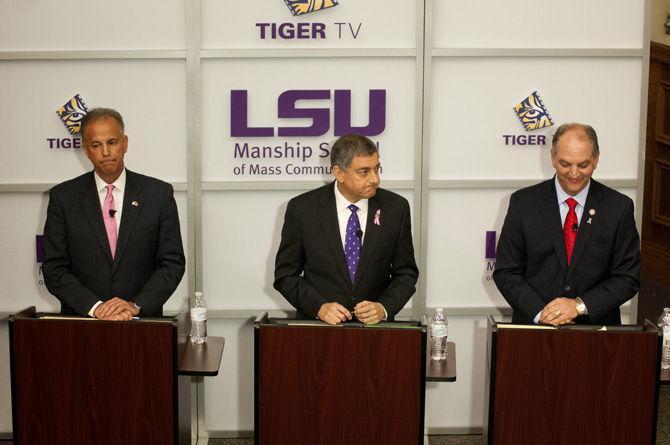Students flipping through their fall planners and calendars are circling Oct. 24 in red ink to mark the Western Kentucky University football game. But few know that date also marks a turning point in Louisiana’s political future.
Sometime between tailgating and 6 p.m. kickoff, concerned state residents hope to see a substantial voter turnout for the gubernatorial election the same day. However, state officials and student leaders are predicting a low turnout at the polls for Generation Y — otherwise known as “millennials.”
According to a June 2015 report from the U.S. Census Bureau, millennials — defined as American youth born between 1982 and 2000 — represent more than one-fourth of the U.S. population, outnumbering the 21.7 percent of baby boomers in America.
Regardless of voter turnout, Louisiana Secretary of State Tom Schedler said 25 percent of Louisiana’s population could sway the election in a particular direction — though, with millennials’ voting presence, it is difficult to determine whether that will tilt to the right or left.
“We’re seeing more and more of a shift of new registrants, nominally in that age group, to a non-party affiliation, so it’s very difficult to peg where their vote goes,” Schedler said.
Although 61.6 percent of people ages 18-24 in the state are registered voters, Schedler said less than half show up to the polls. He said he thinks this is because college students have other priorities, and the voting process is taxing and complicated.
Schedler said he hopes to simplify the voting process for college students by passing legislation to allow student IDs as an acceptable form of identification at voting precincts. He said he is working to make college IDs across the state more uniform, adding sections for a photo and electronic signature in the same locations.
Another of Schedler’s projects involves moving toward a more technologically efficient voting system, in which students could vote for their precinct’s candidates from the LSU Student Union on iPads, so they would not have to request absentee ballots or register for early voting.
Sarah Bryson, mass communication junior and state chair of the Louisiana Federation of College Republicans, agreed with Schedler’s prognosis of millennial voter apathy.
Bryson said her organization, an affiliate of the College Republican National Committee, works to engage millennials on college campuses by promoting the Republican brand and ideology.
Based on her observations, Bryson said she thinks election drama, attack advertisements and negative campaigning turn millennials away from a candidates. Generation Y, she said, is a very tolerant group of individuals who do not like labels.
“You even see that with their typical ideology,” Bryson said. “Usually, millennials are a little bit more progressive on social issues and a little bit more conservative on fiscal issues.”
Michael Dyson, computer science senior and president of College Democrats, said millennial voters want a governor who will listen to them.
“If I’m reaching out to my government officials, then I want to know that my government officials are listening,” Dyson said. “And I don’t particularly think that has been happening to the extent that we would like it to the past eight years or so.”
Dyson said College Democrats hopes to mobilize students toward John Bel Edwards, the only Democrat in the race.
Mass communication sophomore and Geaux Vote LSU Vice President Maddie Melancon said she thinks Edwards is a likely choice for the millennial vote because of the general liberal leanings she sees in university culture.
Geaux Vote LSU, a campus organization that encourages and guides LSU students to register to vote, sat at Free Speech Plaza during Fall Fest to spread the word about the upcoming election.
Despite various efforts, Melancon said she thinks millennial voter turnout will remain low.
“I think … some people still are in that mindset that they don’t have the power, that their voice won’t matter in[the election],” Melancon said.
Dyson said millennials comprise such a large percentage of the population that their opinion should be reflected in the polls.
Bryson said gubernatorial candidates should remember that party lines do not exist on a millennial voter’s political compass.
“[Millennials] are always a swing vote — it’s kind of like a swing generation,” Bryson said.
Students, officials predict direction of millennial vote in gubernatorial election
October 22, 2015
Gubernatorial candidates Scott Angelle, Jay Dardenne, and John Bel Edwards await questioning during the final gubernatorial debate on Oct. 21, 2015, in the Holiday Forum.
More to Discover








